loyola llothta
☭☭☭
No they not but the fourth largest following Haiti, Brazil and the USAYou definitely should, they've retained a lot of African culture, and actually they're ahead of Haiti, just behind Brasil and US.
No they not but the fourth largest following Haiti, Brazil and the USAYou definitely should, they've retained a lot of African culture, and actually they're ahead of Haiti, just behind Brasil and US.
Full rankings on page 15 (physical page no.5) if anyone interested: http://www3.weforum.org/docs/TT15/WEF_Global_Travel&Tourism_Report_2015.pdfhttp://jamaica-gleaner.com/article/news/20150518/jamaicas-collapse-international-tourism-ranking-
major-blow-shahine-robinson
Opposition spokesperson for tourism and cruise shipping, Shahine Robinson is expressing deep concern about Jamaica's worst ever ranking in the Global Travel & Tourism Competitiveness Report 2015 published biennially by the internationally respected Swiss-based World Economic Forum.
"With growth rates already lagging way behind competing destinations in the region, the stubborn, lacklustre and visionless approach of tourism minister, Dr Wykeham McNeill adds nothing to turning the sector around. Jamaica dropped nine places to rank 76 out of 141 countries, the worst ever, and leaving it behind is a slew of regional destinations including Trinidad and Tobago," said Robinson. She also noted that when the Jamaica Labour Party left office in 2011, the country ranked 65 out of 139 countries.
The report ranked countries based on their score in its travel and competitiveness index. The index is comprised of four sub-indices including: enabling environment; travel and tourism policies and enabling conditions; infrastructure; and natural and cultural resources.
Robinson noted that safety and security concerns continue to be a major bugbear to Jamaica's tourism sector and again used the opportunity to call on the tourism and national security ministers to more seriously address the problem in the major resort areas. She argued for an increase in the number of police units, more frequent patrols, speedy investigations and community policing as some of the ways to better tackle the challenge. Beyond that she noted that Jamaica's walled in tourism industry will have to overtime augment itself to better benefit the Jamaican people and allow for more integration with people and their communities.
Robinson reminded McNeill to desist with immediate effect from continued gloating at Jamaica's less than average growth performance and instead focus on preparing the country for the imminent opening up of Cuba, propelling higher tourist arrival growth rates, significantly improving the nation's tourism product and tackling crime and violence.














Maranhão is the first Brazilian state to have an undergraduate degree in African and Afro Brazilian Studies, approved by the Ministry of Education.
Puerto Rico's population swap: The middle class for millionaires
By Franz StrasserBBC News, Washington
- 5 May 2015
- From the sectionMagazine
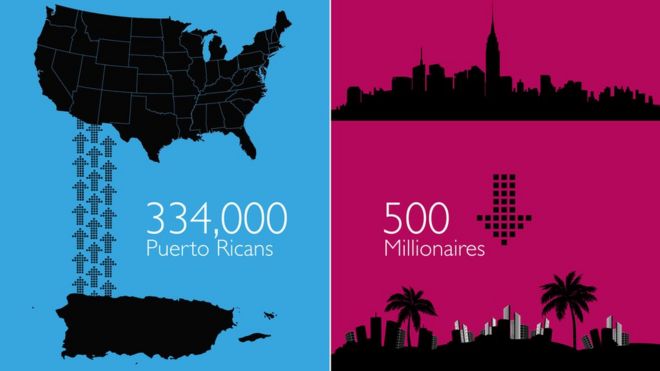
Puerto Rico's struggling economy has led to an exodus of young people moving to the US mainland - while wealthy Americans are starting to call San Juan home. As a result, the economy and identity of both places are changing in surprising ways.
While the US economy is steadily improving, Puerto Rico's unemployment rate has remained at over 13%, twice the US national average, for the last decade. The island is facing a fiscal crisis with $72bn (£47.5bn) in debt.
So the government is looking elsewhere for relief. It has started to lure America's super wealthy from the US East Coast. Two acts passed in 2012 guarantee no capital gains taxes and a mere 4% tax rate on their business to those who make Puerto Rico their primary residence.
More than 500 eligible individuals have answered the call.
"There has been some concern that we're not contributing enough on the island and not everybody is happy about that," says Robb Rill, who moved his business down in 2013.
He says the island is benefitting.
"There's probably been almost a billion dollars invested on the island since these acts have passed, and that's a billion dollars that would not have been invested on the island had there not been the proper incentives. So the everyman on the street doesn't necessarily see the direct benefit, but I can tell you that there is an immeasurable benefit not just on the real estate but through direct investment which is making a difference."

What do they get?
Jump media player
- No federal taxes on capitals gains
- 4% corporate tax rate on their business
Media player help
Out of media player. Press enter to return or tab to continue.
Media captionA tour of the Ritz Carlton Reserve in Puerto Rico

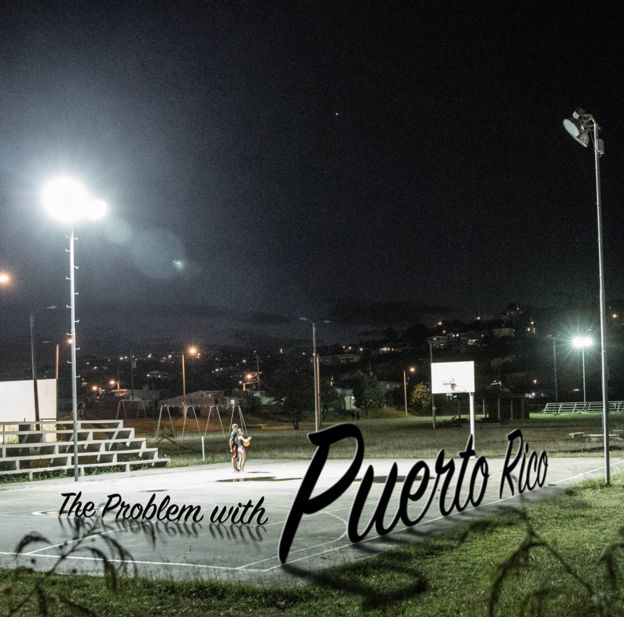
'Perfect storm'
This influx of mainland monied comes as tens of thousands of Puerto Ricans leave every year. They head in search of more opportunity on the US mainland, where they have the right to work as US citizens.
"What's going on in Puerto Rico right now it's the perfect storm," says Valerie Rodriguez, a young lawyer in San Juan and member of the New Progressive Party.
"You have a population in Puerto Rico where the productive sector is shrinking and the young professionals are leaving. Then you have an elderly population that's increasing in size, and obviously that population is going to depend more and more on government."
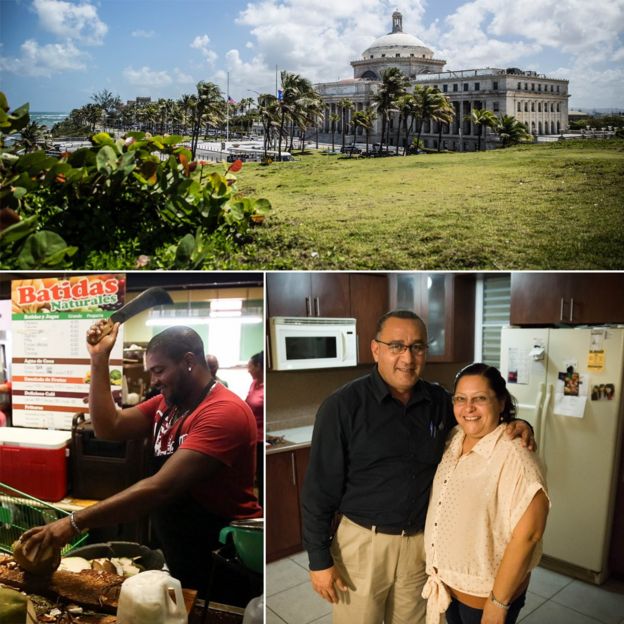
Clockwise: the Puerto Rico capitol, Orlando Rivera and his wife in Ponce, and a worker at the San Juan market
Funding those government services is a contentious issue.
"I am the worker, I am the one who is paying the taxes," says Orlando Rivera, a store manager in the city of Ponce. "I have to sustain my family, pay a 400-dollar electrical bill and my daughters' tuition fees. And in the meantime [the millionaires] aren't bringing any solutions to the problem."

Little opportunity
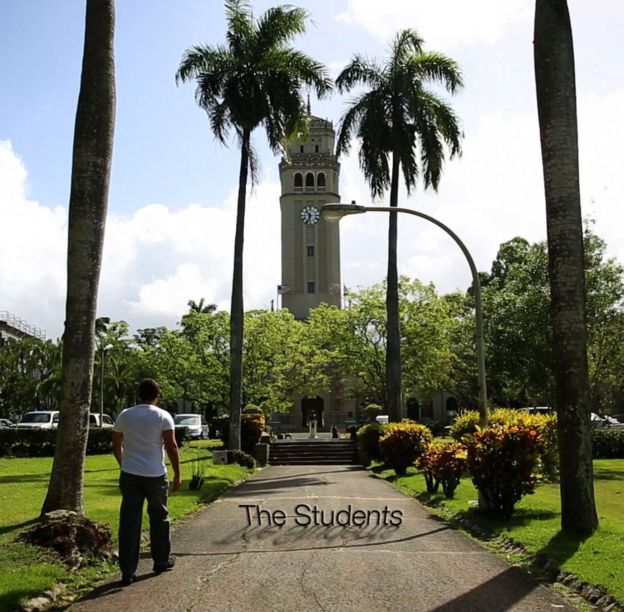
Jump media player
Media player help
Out of media player. Press enter to return or tab to continue.
Media captionPuerto Rico's students sound off
For those who aren't wealthy, staying in Puerto Rico is not always an option.
"Young people here that go to university and prepare themselves, they really want to stay on the island and it's not something they can do." says Ms Rodriguez.
The changing demographics are altering Puerto Rico's relationship with the mainland.
"Students that have decided to leave the island for job opportunities are important for Puerto Rico because they create other opportunities," says Uroyoan Walker, the President of the University of Puerto Rico. "It's very important that the university and the people of Puerto Rico stay connected with that diaspora so that we can become a stronger and bigger country."

The big migration
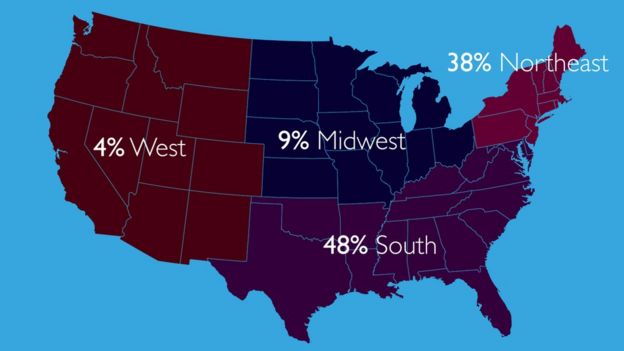
Puerto Ricans moving to the US between 2005-2012 (Source: Pew Research Center)
As citizens of a US territory, Puerto Ricans have the same right to work as any American born in the 50 states. More than 300,000 of them have left the island and headed for the US mainland in the last decade. Traditionally they have moved to New York, but more recently a third of them have moved to Florida. In Central Florida alone, 100 new families arrive every single week.
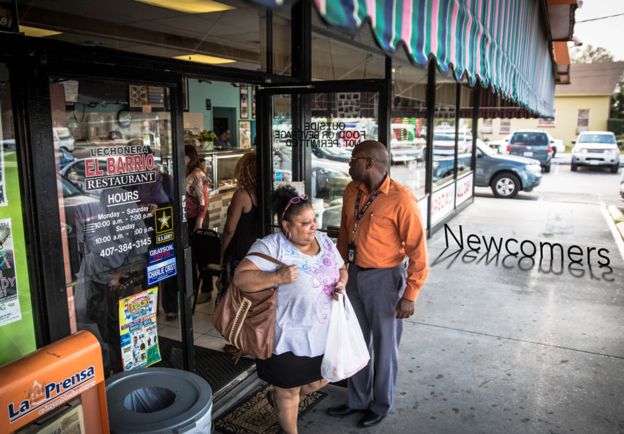
- "I miss Puerto Rico but I do not think I'm moving back there. Here there is more help here for the children, who are my priority." - Vincent Diaz Lebron
- "We came for the education. Public schools here are as good as private schools in Puerto Rico. You can have opportunities." - Jean Pierre Hernandez
- "Jobs for Puerto Ricans are very good. Not everyone is lucky enough to get a job soon but if you are bilingual and have a lot of energy, it is easy for Puerto Ricans to get a job here." - Kyana Leon

Doubling sales
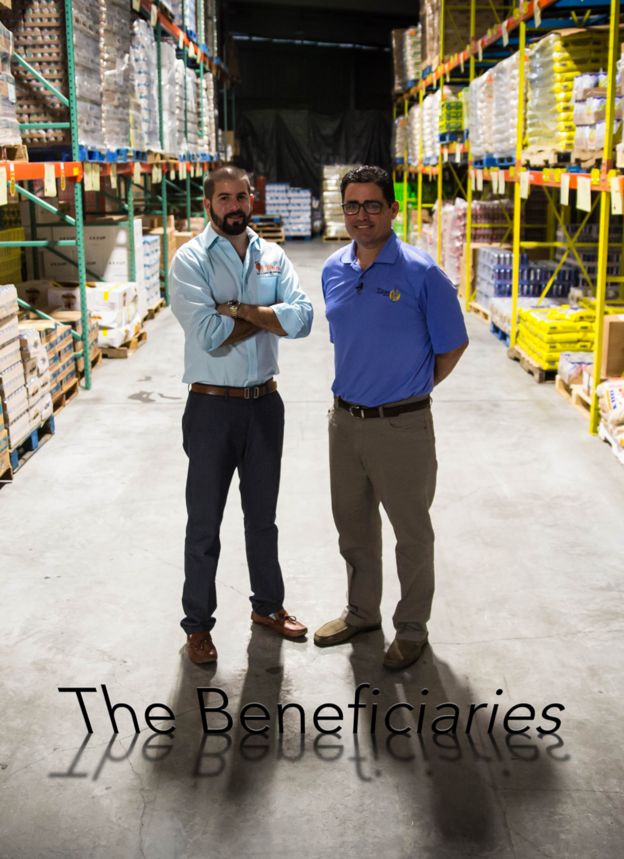
This increased migration has presented an opportunity for entrepreneurs.
Titan Products of Puerto Rico opened a distribution centre in Central Florida last spring. Over 40,000 square feet of Puerto Rican products are being moved here and shipped across the Southern US.
"People used to travel there and bring back in their luggage, the cookies, the beans, or the rice," says Rafael Julia, the sales director for Titan. Alternatively, they would get products sent through the post or brought back by friends or family, she adds.
"We receive probably one to two containers a week, they come from Puerto Rico, we consolidate all the cargo down there. We have over 176 clients from small bodegas, family-owned, to big supermarkets."
They say their business is booming.
"We can double our sales next year. We are currently talking to big players like Publix and Wal-Mart to have our products there."


Popular products
- Lotus pineapple juice
- Cameo cookies
- Tacos de Mariscada

Florida, Florida, Florida
And where there's people and money the politicians won't be too far behind. Puerto Ricans residing on the mainland have the same voting rights and could be the kingmakers in one of the most important Presidential swing states in 2016.
"I don't think any presidential candidate who is looking to secure Florida will be able to do that without counting on the support of the Puerto Rican communities," says Jose Luis Marantes a political activist with Mi Familia in Orlando.
"It's not enough just to be able to say a couple of words in Spanish to be able to say that you're in solidarity with the Latino community and with the Puerto Rican community. You need to speak about jobs, about health care, about education, and about opportunities for folks to come in."


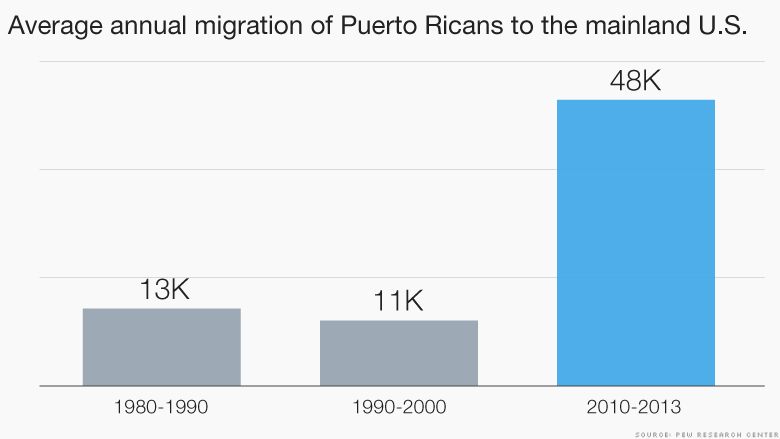
I'm taking you forgot about Atlanta?
this is the most interesting part for me. for so long the Northeast was the destination for Puerto Ricans but now Orlando is their city like Cubans in Miami. Blacks need to learn from this
Ive never been there so idkI'm taking you forgot about Atlanta?
I remember when Atlanta was a city for southerners. Now, anyone that's black from all over the country, wants to go there. It's been like this since the mid 90's. Atlanta is a black city.
The Government of Russia has pledged assistance to Jamaica in the areas of agriculture and the environment.
This was disclosed by Minister of Science, Technology, Energy and Mining Phillip Paulwell, who is representing Jamaica at the 19th St Petersburg International Economic Forum in Moscow from June 18 to 20.
Speaking with the Government's news agency from Moscow on Thursday, Paulwell said he has had meetings with various representatives from the Russian government to strengthen cooperation in specialised areas.
"I held discussions with the agriculture minister [Alexander Tkachov]. That discussion was very productive. The minister has pledged to assist us with restoring our mined-out [bauxite] lands to full productivity. He promised to share with us the latest in Russian technology and expressed the hope that both livestock and food crops can be exported from Jamaica to Russia," said Paulwell. He said that coming out of talks with Russia's Minister of Natural Resources and Environmental Protection, SergeiDonskoi, an agreement has been reached to provide support to the island on environmental issues.
"A lot was discussed. In the end, it was agreed that Russia would offer its assistance to Jamaica," Paulwell said.
The minister said he is looking forward to the start of discussions at the forum, which is being held under the theme 'Time to Act: Shared Paths to Stability and Growth'.
The annual forum gathers the world's leading decision-makers to identify and deliberate the key challenges facing emerging markets and growth economies, Russia and the world, and to engage them in finding solutions.
It includes an energy summit where government representatives from several countries, including Russia and Jamaica, chair of energy corporations or their senior executives as well as industry experts, are expected to parti-cipate in debates, seminars, and country-specific round-table discussions for the exchange of ideas and insights on global energy and development strategies.



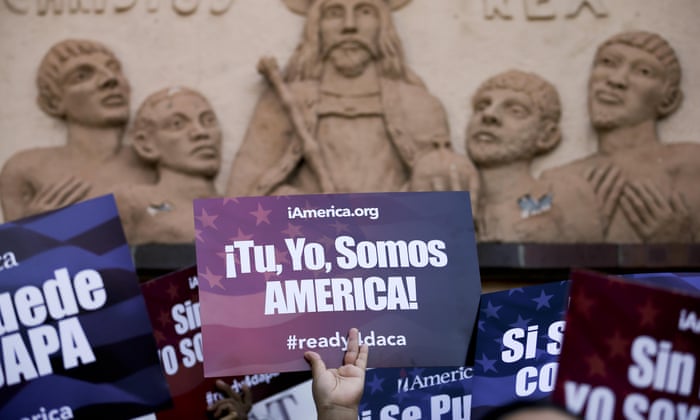
US now has more Spanish speakers than Spain – only Mexico has more
- US has 41 million native speakers plus 11 million who are bilingual
- New Mexico, California, Texas and Arizona have highest concentrations

A woman holds a sign that says in Spanish, ‘You, me, we are America!’ during a rally about immigration in San Diego in February 2015. Photograph: Gregory Bull/AP
Stephen Burgen in Barcelona
Monday 29 June 2015 13.12 EDT Last modified on Monday 29 June 2015 13.36 EDT
The United States is now the world’s second largest Spanish-speaking country after Mexico, according to a new study published by the prestigious Instituto Cervantes.
The report says there are 41 million native Spanish speakers in the US plus a further 11.6 million who are bilingual, mainly the children of Spanish-speaking immigrants. This puts the US ahead of Colombia (48 million) and Spain (46 million) and second only to Mexico (121 million).
Among the sources cited in the report is the US Census Office which estimates that the US will have 138 million Spanish speakers by 2050, making it the biggest Spanish-speaking nation on Earth, with Spanish the mother tongue of almost a third of its citizens.
By state the highest concentration is in the former Spanish colonies of the south and south-west, with New Mexico top at 47%, followed by California and Texas (both 38%) and Arizona (30%). Some 18% of New Yorkers speak Spanish while only 1.3% of West Virginians do. Perhaps surprisingly, more than 6% of Alaskans are Spanish speakers.
The report, El español, una lengua viva – Spanish, a living language – estimates that there are 559 million Spanish speakers worldwide, a figure that includes 470 million native speakers and those with some command of the language.
The Instituto Cervantes was established in 1991 to promote the Spanish language abroad and last year had more than 200,000 students registered on its courses. It estimates that 21 million people are currently studying Spanish and here, too, the US leads with 7.8 million learning the language, followed by Brazil and France.
The report adds that two-thirds of Spanish-linked GDP is generated in two areas: North America (US, Canada and Mexico) and the European Union.
Between them they account for 78% while Latin America only accounts for 22%. It calculates that altogether Spanish speakers contribute 9.2% of the world’s GDP.
The Index of Human Development ranks Spanish as the second most important language on earth, behind English but ahead of Mandarin. It is also the third most widely used language on the internet, although less than 8% of internet traffic is in Spanish. The report says that Spanish is the second most used language on Twitter in London and New York. It also comes second on Facebook, a long way behind English though well ahead of Portuguese, Facebook’s third language.
http://www.theguardian.com/us-news/2015/jun/29/us-second-biggest-spanish-speaking-country
